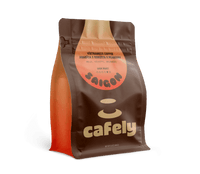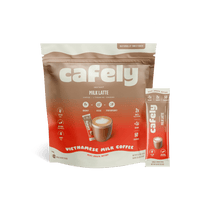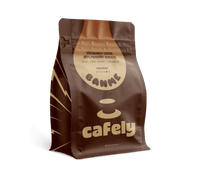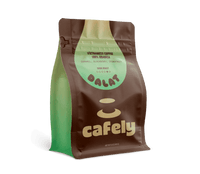Your whole day depends on how you start your morning. From mood to focus to stamina — what you do in the first hour of your day sets the rhythm for the next 16.
Instead of relying on caffeine or sugary hacks, building a sustainable morning routine is one of the most effective ways to feel sharp, motivated, and resilient all day.
In this guide, you’ll find the best morning routines for boosted energy, common pitfalls that harm more than help, smarter caffeine alternatives, and answers to the most frequently asked questions about energy support.
Let’s get into the habits that fuel all-day performance.
How To Have More Energy in the Morning: Top 10 Tips
Waking up tired doesn’t have to be your norm. These 10 proven tips will help you build a morning routine that boosts energy and sharpens focus.
1. Hydrate First Thing

Your body wakes up dehydrated, and even mild dehydration drains energy.
Drinking water as soon as you wake up jumpstarts your metabolism and supports every major organ system, including the brain [1]. This simple act helps flush out toxins and rehydrates cells, boosting alertness.
Tips for hydrating in the morning:
- Aim for 300 to 500 mL of filtered water within 15 minutes of waking
- Add a pinch of sea salt or a squeeze of lemon to replenish electrolytes
- Avoid coffee before water — caffeine is a diuretic and can worsen dehydration
If you're wondering how to have more energy in the morning, start by rehydrating before anything else.
2. Expose Yourself to Natural Light
Sunlight tells your brain it’s time to be awake.
Morning light resets your internal clock by regulating melatonin and boosting cortisol in a natural, healthy way [2]. This improves your wakefulness, energy, and even mood.
Easy ways to get natural light during your morning routine:
- Step outside for at least 5 to 10 minutes
- Open blinds and let sunlight into your space
- Use a light therapy lamp in darker seasons or early hours
If you're aiming to build a morning routine for productivity, this is one of the most effective and immediate changes you can make.
3. Do Light Movement or Stretching
A little movement goes a long way in waking up the body and mind.
You don’t need a full workout. Just a few minutes of stretching or light exercise boosts circulation, increases oxygen to the brain, and shakes off sleep inertia [3].
Feel-good movements that can help wake up your system:
- Try yoga, dynamic stretches, or bodyweight movements
- Roll out your shoulders, spine, and hips
- Consider a quick mobility routine or foam rolling
This simple act helps oxygenate your system by increasing blood flow and respiratory rate — giving your brain and muscles a fresh supply of oxygen to boost alertness. Better oxygen delivery supports mental clarity, physical readiness, and even mood regulation.
4. Eat a Balanced Breakfast

Skip the sugar crash. Feed your brain.
A quality breakfast fuels your body and prevents energy dips later. Focus on whole, protein-rich, and fiber-packed foods that support steady glucose levels.
Optimal breakfast choices for consistent energy:
- Include at least 15 to 20 g of protein (eggs, Greek yogurt, tofu)
- Add slow-digesting carbs like oats, quinoa, or whole-grain toast
- Don’t forget healthy fats (nuts, avocado, olive oil)
A smart breakfast is key if you're serious about the best morning routine for energy and long-term mental focus. In one study, workers who ate a nutrition-adequate breakfast showed better short-term memory, focus, and mood just two hours later, compared to those who skipped breakfast or ate low-nutrient meals [4].
5. Practice Intentional Breathing or Meditation
Calm your nervous system and clear your mind before the day begins.
Even a few minutes of focused breathing can reduce cortisol spikes, improve oxygenation, and increase mental clarity [5]. Meditation also boosts mood and trains your brain for focus.
Simple mindfulness practices to start your day with intention:
- Try box breathing (inhale 4, hold 4, exhale 4, hold 4)
- Use an app like Headspace or Insight Timer
- Start with just 3 to 5 minutes — consistency matters more than length
This habit supports both morning energy and long-term stress resilience by regulating cortisol, improving emotional control, and training your brain to stay focused under pressure.
Over time, consistent breathwork or meditation strengthens your nervous system’s ability to recover from daily stressors, helping you stay clear-headed and energized even on busy days.
6. Set Daily Priorities or Journal
Mental clutter kills energy.
Taking a few minutes to plan your top three tasks, or adding an entry into your journal, can help you avoid decision fatigue later. It clears space in your mind, keeps you focused, and boosts motivation.
Useful techniques that can organize your thoughts for the day:
- Use a paper planner or digital notes
- Write out top tasks, your schedule, or a quick gratitude list
- Reflect on a win from yesterday to spark positive momentum
This is a core tactic in any morning routine for productivity, helping you align energy with intention.
7. Avoid Immediate Screen Use
Scrolling first thing spikes dopamine and drains focus before the day begins.
When you check your phone before doing anything else, your brain starts the day in a reactive state [6]. This floods your system with fragmented thoughts, reduces motivation, and increases anxiety.
Best practices for managing screen time in the morning:
- Keep your phone on airplane mode for the first 30 to 60 minutes
- Charge your phone outside the bedroom if possible
- Use time without your phone to move, hydrate, and ground yourself
This small shift can have a big impact on morning energy by reducing cognitive overload, protecting dopamine balance, and helping your brain ease into the day with more clarity.
Giving yourself screen-free time first thing also supports better mood regulation and focus — which makes your energy more sustainable throughout the day.
8. Take a Cold Shower or Splash Cold Water
Cold exposure activates your body’s alert systems — fast.
Cold water triggers a release of norepinephrine, boosting energy, clarity, and mood. It also improves blood flow and helps reduce inflammation [7].
Allow cold water to boost morning alertness with the following methods:
- Try a cold rinse after your warm shower
- Splash your face with cold water for a quicker method
- Use a cold compress around the neck or wrists
This is a powerful, natural morning energy booster that doesn’t require caffeine or supplements.
9. Include a Short Walk Outside
Nature, light, and movement — all in one habit.
Walking outside combines multiple energizing elements. It elevates your heart rate, exposes you to light, oxygenates your brain, and connects you with your surroundings [8].
Walk your way into a good day with these easy techniques:
- Walk around your block or to a local park
- Aim for 5 to 15 minutes, even on busy days
- Breathe deeply and move at a brisk pace
This routine is perfect for those who need a practical and refreshing morning energy boost because it combines light exercise, natural sunlight, and mental reset — all without requiring equipment, planning, or a full workout.
It’s simple enough to do anywhere, which makes it easy to stay consistent even on busy mornings.
10. Use Uplifting Music or a Podcast

Sound can shift your mood and mindset in minutes.
Starting your day with motivational music, a learning-based podcast, or even laughter can increase dopamine, reduce stress, and energize your mind [9].
Set a positive morning tone with these inspirational sounds:
- Create a go-to playlist of upbeat or empowering songs
- Choose a podcast that inspires, teaches, or entertains
- Use this time to multitask (stretching, journaling, or walking)
No matter your style, audio is a powerful tool in designing your best morning routine for energy.
Avoid These 5 Common Morning Energy Killers
Building the best morning routine for energy means more than just adding good habits — you also need to remove sneaky culprits that silently drain your battery before the day even begins.
Here are five common traps that sabotage your energy, even if you get a full night’s sleep.
1. High-Sugar or Refined-Carb Breakfasts
What seems like fuel often leads to a crash.
Grabbing a muffin, sugary cereal, or even fruit juice might feel energizing, but these foods spike blood sugar rapidly, only to leave you crashing mid-morning. A glucose rollercoaster increases irritability, brain fog, and fatigue by late morning.
What breakfast foods to avoid:
- Pastries, white bread, sugary granola
- Fruit-only breakfasts or fruit juice without protein
- Sweetened yogurts or instant oats with added sugar
Better swaps for an energizing breakfast:
- Protein + fat combo (e.g. eggs + avocado)
- Greek yogurt with chia seeds and berries
- Steel-cut oats with almond butter
Energy shift tip: If you're asking how to have more energy in the morning, cutting sugar is one of the most effective first steps.
2. Information Overload Early in the Day
Starting your morning with a flood of digital input can quickly drain your energy reserves.
Checking emails, scrolling Instagram, or reading intense news stories first thing bombards your brain with micro-decisions, distractions, and cortisol-triggering content.
Early information overload can lead to:
- Decision fatigue before 9 AM.
- Lower motivation and mental clarity
- Reduced emotional bandwidth for real priorities
Energy shift tip: Instead, delay screen exposure for the first 30 to 60 minutes of your day, and build mental clarity before getting into the digital world. This small tweak can drastically improve any morning routine for productivity.
3. Negative Morning Self-Talk
Your internal dialogue shapes your energy and motivation.
Waking up with thoughts like “I’m already behind” or “I’ll never get it all done” spikes cortisol and increases perceived stress — even before you've started your day.
How negative self-talk affects your morning:
- Higher anxiety, reduced focus
- Mental exhaustion by mid-morning
- Emotional fatigue impacting creativity and communication
Energy shift tip: Try writing one thing you're looking forward to or something you’re grateful for. Morning journaling or affirmations can shift the tone of your entire day.
4. Chronic Dehydration
Low hydration is one of the most overlooked energy killers.
You lose fluid overnight through breath and sweat, so skipping morning hydration keeps your body in a deficit. This reduces oxygen delivery and brain performance — even if you’re eating well and sleeping enough.
Signs of low hydration:
- Brain fog or headaches
- Sluggish digestion
- Dry skin or dizziness in the morning
Energy shift tip: Keep a water bottle near your bed and drink a full glass within 10 minutes of waking. Hydration is the simplest morning energy booster there is.
5. Poor Morning Posture or Sedentary Start
How you sit (or slouch) affects how awake you feel.
Remaining sedentary in the same hunched position — checking your phone, working from bed, or slouching at breakfast — can physically compress your lungs, reduce oxygen flow, and signal your nervous system to stay in “rest mode.”
Energy-enhancing posture tips:
- Sit upright with shoulders rolled back
- Try 1 to 2 minutes of spinal stretches or backbends
- Walk for 3 to 5 minutes after breakfast
Energy shift tip: Correcting posture is a fast fix that belongs in any morning routine for energy, especially if you're stuck at a desk all day.
5 Non-Caffeine Supplements to Support Energy

Not everyone wants to start the day with coffee — and not everyone should.
If you're caffeine-sensitive or looking for a more balanced energy boost, these non-stimulant supplements can support mental clarity and physical stamina without jitters or crashes.
1. Rhodiola Rosea
This adaptogen helps your body adapt to stress and fight fatigue.
Rhodiola works by modulating cortisol and supporting neurotransmitters like dopamine and serotonin [10]. It's particularly helpful during burnout, high-stress periods, or mood dips.
Benefits of Rhodiola Rosea:
- Boosts mental performance during stress
- Reduces brain fog and physical fatigue
- Non-sedating and non-stimulating
We recommend taking Rhodiola rosea in the morning or early afternoon. Rhodiola fits beautifully into a morning routine for productivity, especially if you’re navigating demanding work or emotional stress.
2. Vitamin B12 (Methylcobalamin)
Essential for brain function, red blood cell production, and nerve health.
Vitamin B12 deficiency is common, especially among vegetarians, older adults, or those with poor nutrient absorption [11]. Low levels can cause mental fog, fatigue, and even depression.
What to look for in vitamin B12 supplements:
- Methylcobalamin form (more bioavailable)
- Sublingual tablets or sprays for better absorption
- Consider daily intake if levels are low or energy dips are consistent
Vitamin B12 is one of the most foundational tools in optimizing how to have more energy in the morning, especially if you wake up sluggish despite decent sleep.
3. CoQ10 (Ubiquinol)
This antioxidant supports mitochondrial function — the powerhouses of your cells.
If your mitochondria are underperforming, your energy production tanks. CoQ10 (especially in its reduced form, ubiquinol) helps support cellular energy output and combats fatigue, especially in people over 30 or those on statins [12].
Top perks of CoQ10:
- Increases energy levels and stamina
- Supports heart health and circulation
- May reduce brain fog and sluggishness
Take with breakfast — it’s fat-soluble, better absorbed with food, and works best when taken in the morning to support energy production throughout the day.
4. Maca Root
A natural energy and mood booster that also supports hormone balance.
Used traditionally in Peruvian medicine, maca helps with endurance, vitality, and emotional balance. It’s especially helpful for people who feel drained by stress, menstrual cycles, or low libido [13].
Energy perks of Maca Root:
- Supports hormonal health (especially for women)
- Enhances resilience without overstimulation
- Can improve mood and stamina over time
Maca is a great natural choice if you're looking to rebuild sustained energy from within — not just stimulate it.
5. Magnesium (Glycinate or Malate)
Crucial for over 300 biochemical reactions — including energy metabolism.
Many people are magnesium-deficient without realizing it. Low magnesium affects sleep quality, recovery, muscle function, and focus — all key ingredients in maintaining a balanced morning routine for energy [13].
Best forms of magnesium to look for:
- Glycinate is calming and supports the nervous system
- Malate is energizing and helps with muscle function
- Avoid oxide, as it has the lowest absorption
Take in the evening for sleep support or in the morning if using malate for energy.
18 Days: That’s All It Takes to Build a Habit
It can take anywhere from 18 to 254 days to form a new habit, depending on the complexity. That means your morning routine does not need to be perfect — just practiced.
Each small action adds momentum, rewires your brain, and builds a foundation for long-lasting energy.
Start small, stay consistent, and before you know it, your new routine will feel effortless — and your mornings, unstoppable.
10 FAQs About Morning Routines and Energy
Got questions about building a better morning routine for lasting energy? These quick answers cover the most common concerns, from breakfast to screen time.
1. How Long Does it Take to Feel the Benefits of a New Morning Routine?
It usually takes 7 to 14 days of consistency to notice a real shift in energy. Your body and brain need time to adapt, but small wins often show up within the first week.
2. Do I Have to Wake Up Early to Have an Energizing Morning?
Not at all. The best morning routine for energy is less about the hour on the clock and more about what you do with your time once you're awake.
3. Is Skipping Breakfast Bad for Energy?
It depends on your body. Some people thrive with intermittent fasting, while others feel foggy without food. Focus on how to have more energy in the morning — not just following trends.
4. What’s the Best Thing to Drink in the Morning Besides Coffee?
Water with lemon, green tea, or an electrolyte drink are great options. They hydrate and support alertness without relying on caffeine.
5. Can Supplements Really Replace Sleep?
No — nothing replaces deep, restorative sleep. Supplements like Rhodiola rosea or vitamin B12 can support your energy, but they can’t undo sleep debt.
6. Is Caffeine-Free Always Better for Morning Energy?
Not necessarily. Caffeine can be helpful if used mindfully, especially when paired with calming compounds like L-theanine to smooth out the effects.
7. What’s a Quick Morning Fix for Days When I’m Low on Time?
Drink water, move for five minutes, and eat a protein-rich snack. These fast morning energy boosters help reset your system even on busy days.
8. How Can I Build a Morning Routine with Kids or a Busy Job?
Start small. Pick 2 to 3 habits you can do in under 15 minutes. Even brief routines make a difference when done daily.
9. What’s Better: Exercise in the Morning or Evening for Energy?
Morning workouts are better for elevating energy and mood throughout the day. Many people find that early workouts are key for morning routines that are focused on productivity.
10. Do I Need to Take Supplements in the Morning for Them to Work?
Some do work better earlier in the day (like vitamin B12 or Rhodiola rosea), but others — like magnesium — may be better at night. Always check the usage recommendations for each supplement, and plan accordingly.
References:
- Vieux, F., Maillot, M., Rehm, C. D., Barrios, P., & Drewnowski, A. (2019). The Timing of Water and Beverage Consumption During the Day Among Children and Adults in the United States: Analyses of NHANES 2011–2016 Data. Nutrients, 11(11), 2707.
- Blume, C., Garbazza, C., & Spitschan, M. (2019). Effects of light on human circadian rhythms, sleep, and mood. Somnology: Sleep Research and Sleep Medicine, 23(3), 147–156.
- Kovac, K., Ferguson, S. A., Paterson, J. L., Aisbett, B., Hilditch, C. J., Reynolds, A. C., & Vincent, G. E. (2020). Exercising Caution Upon Waking-Can Exercise Reduce Sleep Inertia? Frontiers in Physiology, 11, 254.
- Tang, Z., Zhang, N., Liu, A., Luan, D., Zhao, Y., Song, C., & Ma, G. (2017). The effects of breakfast on short-term cognitive function among Chinese white-collar workers: protocol for a three-phase crossover study. BMC Public Health, 17(1).
- Bentley, T. G. K., D’Andrea-Penna, G., Rakic, M., Arce, N., LaFaille, M., Berman, R., Cooley, K., & Sprimont, P. (2023). Breathing practices for stress and anxiety reduction: Conceptual framework of implementation guidelines based on a systematic review of the published literature. Brain Sciences, 13(12).
- Nakshine, V. S., Thute, P., Khatib, M. N., & Sarkar, B. (2022). Increased Screen Time as a Cause of Declining Physical, Psychological Health, and Sleep Patterns: A Literary Review. Cureus, 14(10).
- Kunutsor, S. K., Lehoczki, A., & Laukkanen, J. A. (2024). The untapped potential of cold water therapy as part of a lifestyle intervention for promoting healthy aging. GeroScience.
- Ungvari, Z., Fazekas-Pongor, V., Csiszar, A., & Kunutsor, S. K. (2023). The multifaceted benefits of walking for healthy aging: from Blue Zones to molecular mechanisms. GeroScience, 45(6).
- Ferreri, L., Mas-Herrero, E., Zatorre, R. J., Ripollés, P., Gomez-Andres, A., Alicart, H., Olivé, G., Marco-Pallarés, J., Antonijoan, R. M., Valle, M., Riba, J., & Rodriguez-Fornells, A. (2019). Dopamine modulates the reward experiences elicited by music. Proceedings of the National Academy of Sciences, 116(9), 3793–3798.
- Ivanova Stojcheva, E., & Quintela, J. C. (2022). The Effectiveness of Rhodiola rosea L. Preparations in Alleviating Various Aspects of Life-Stress Symptoms and Stress-Induced Conditions—Encouraging Clinical Evidence. Molecules, 27(12), 3902.
- Ankar, A., & Kumar, A. (2024). Vitamin B12 Deficiency. National Library of Medicine; StatPearls Publishing.
- Tsai, I-Chen., Hsu, C.-W., Chang, C.-H., Tseng, P.-T., & Chang, K.-V. (2022). Effectiveness of Coenzyme Q10 Supplementation for Reducing Fatigue: A Systematic Review and Meta-Analysis of Randomized Controlled Trials. Frontiers in Pharmacology, 13, 883251.
- Carpio, del, Alvarado-Corella, D., Quiñones-Laveriano, D. M., Araya-Sibaja, A., José Vega-Baudrit, Monagas-Juan, M., Navarro-Hoyos, M., & Villar-López, M. (2024). Exploring the chemical and pharmacological variability of Lepidium meyenii: a comprehensive review of the effects of maca. Frontiers in Pharmacology, 15.












